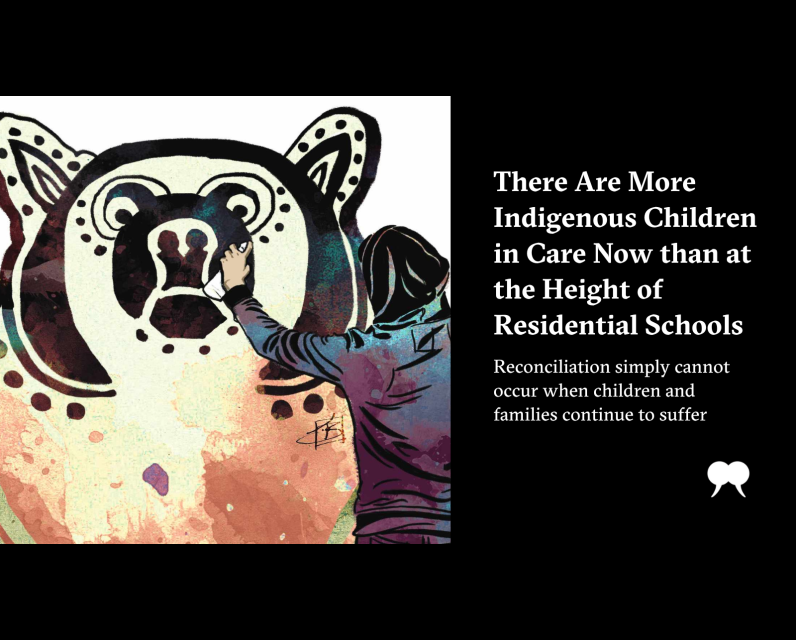There Are More Indigenous Children in Care Now than at the Height of Residential Schools

More than 150,000 children taken. That’s really all you need to know about residential schools. In Canada, more than 150,000 Indigenous children attended these institutions between the 1870s and the late 1990s. There, they died, suffered, and ached—for their families, communities, languages, and ways of life.
Today, there are more Indigenous children in care than there were at the height of the residential school system. This is a momentous problem, especially in a time where so many in Canadian society seek to reconcile. Reconciliation simply cannot occur when our children and families continue to suffer.
I was hired in 2020 to be trained for a new journalism outlet called IndigiNews. My beat was the child welfare system—where I drew on my experiences as a youth worker supporting Indigenous kids involved in the child welfare system. I remain haunted by the stories I reported and the statistics surrounding Indigenous children and youth in Canada. The number of Indigenous girls who go missing while in the care of the province of British Columbia, for example, and the continuation of cycles perpetuated by the child welfare system that seep into Canada’s prisons are amplifying the same harms that, for decades, Indigenous people have fought to heal and recover from.
-
Read more from our Truth and Reconciliation series:
- Intro
- Truth
- Child Welfare
- Economic Development
- Gender
- Media
Before there was the TRC, there was the Indian Residential Schools Settlement Agreement. This settlement was, until recently, the largest class action settlement in Canadian history. The agreement reflects decades of advocacy by Indigenous people to demand accountability for the harms and losses suffered by children in residential schools and for other mechanisms of colonialism, like the losses of land, access to language, ceremony, and culture.
The settlement agreement stands on the shoulders of those who participated in the Constitution Express (a cross-country protest led by Indigenous activists to ensure Indigenous people were included in the patriation of the Canadian Constitution), those families who defended their land during the Kanehsatà:ke Resistance, and those thousands of parents who fought for information on the whereabouts of their children. Then came Idle No More, a movement beginning in 2012 where Indigenous people across Canada stood up to say we are collectively and literally sick to death of our people falling through the cracks.
These are all examples of movements that have contributed to justice and equity for Indigenous people in Canada. To this day, many Canadians aren’t aware that First Nations don’t receive monies from Canadian taxpayers. Our programs and services are partly funded by a trust held by the federal government, and the interest earned by that trust is funnelled into education, health, and governance. This paternalistic approach has been mired in problems, and as a result, we see vast inequities across Canada, including lack of access to clean drinking water and life-saving medications. And it’s that same paternalism that tells Indigenous people we don’t know what’s best for our lands, our communities—and our children.
A 2024 study by the University of Manitoba and the Assembly of Manitoba Chiefs found a “staggering” number of First Nations newborns in Manitoba involved in the child welfare system; a follow-up study this year noted that half of First Nations families in Manitoba have had a child welfare file open on them. In BC, Indigenous children still make up a large percentage of children in the care of the province, despite efforts to divert kids from falling through the cracks and despite the adoption of the United Nations Declaration on the Rights of Indigenous Peoples into provincial law.
The first five Calls to Action are centred on child welfare, an area of Canadian law and policy that is plagued with child apprehension and the breaking apart of Indigenous families. The calls seek to address the overrepresentation of Indigenous children and youth in the care of provincial governments and to provide support to keep Indigenous kids connected to their families and communities.
But, ten years later, we are in a time when these calls are being drowned out by apathy and denial about the harms of residential schools. The momentum that followed the uncovering of unmarked graves and missing children, the Idle No More awakening, and all the other efforts by Indigenous people to capture the attention of the world is waning. Instead, energy is being summoned so Canada can quickly exploit the land for rare minerals in the name of Canadian sovereignty.
We can’t let these calls fade from our minds. Our collective memory needs this information so we don’t forget how Canada allowed the harm of so many children. This memory will help us in paving a new pathway forward. As an Indigenous mother, I have to believe that.
The post There Are More Indigenous Children in Care Now than at the Height of Residential Schools first appeared on The Walrus.
Comments
Be the first to comment